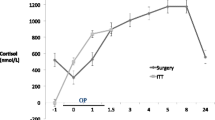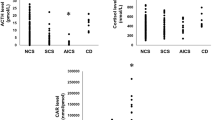Abstract
It is widely accepted that the classical dose of 250.0 μg ACTH (1–24) (tetracosactin) is clearly supra-maximal while 1.0 and 0.03 μg have been shown as the maximal and the lowest stimulatory ACTH doses for cortisol (F) secretion in normal young subjects. Testing with low ACTH dose would better evaluate adrenal sensitivity to corticotropin. The aims of the present study were: a) to clarify the adrenal sensitivity to ACTH in patients with different duration of corticotroph insufficiency by testing with low and very low tetracosactin doses; and b) to evaluate diagnostic implication regarding the ability of ACTH tests to distinguish patients with corticotroph insufficiency from normal subjects. In 24 hypopituitaric patients (HYPOPIT, 15 male and 9 female, age 22–50 yr, BMI: 22–26 kg/m2) with corticotrophin deficiency we studied the F, DHEA and aldosterone (A) responses to challenges with low ACTH doses (0.06 or 0.5 μg iv at 0 min) followed by 250 μg iv (at +60 min). The results in HYPOPIT were compared with those recorded in 12 normal controls (NS, 6 male and 6 female, age 22–34 yr, BMI: 20–25 kg/m2). Basal F and DHEA levels in HYPOPIT were lower than in NS, while A levels were similar in both groups. The F responses to ACTH in HYPOPIT were dose-independent and markedly lower (p<0.0001) than in NS. After the 0.06 and 0.5 μg ACTH dose, 16% of HYPOPIT patients showed δF peak within the range of normal response. No HYPOPIT showed δF peak within the normal range after 250 μg ACTH. The DHEA responses to ACTH in HYPOPIT were dose-independent and markedly lower than in NS (p<0.0001). Overlap between individual DHEA responses in HYPOPIT and NS was present after 0.06 μg and 0.5 μg but not after 250 μg tetracosactin. The A responses in HYPOPIT were dose-dependent and overlapped with those in NS. The adrenal responses to ACTH in HYPOPIT were not associated with the duration of the disease. In conclusion, the present study shows that the mean F and DHEA but not the A responses to ACTH (1–24) are markedly impaired in hypopituitaric patients with corticotroph insufficiency independently of the duration of the disease. The impaired F and DHEA response to ACTH is also independent of the dose, suggesting the existence of relatively enhanced sensitivity of the fasciculata and reticularis adrenal zone to ACTH but meantime remarkable impairment of the adrenal function due to corticotrophin deficiency. In the present study, testing with submaximal ACTH doses did not distinguish patients with secondary adrenal insufficiency from normal subjects.
Similar content being viewed by others
References
Olkers W. Dose-response aspects in the clinical assessment of the hypothalamo-pituitary-adrenal axis, and the low-dose adrenocorticotropin test. Eur. J. Endocrinol. 1996, 135: 27–33.
Thaler L.M., Blevins Jr L.S. The low dose (1 μg) adrenocorticotropin stimulation test in the evaluation of patients with suspected central adrenal insufficiency. J. Clin. Endocrinol. Metab. 1998, 83: 2726–2729.
Ambrosi B., Barbetta L. The role of the low dose ACTH test in the evaluation of central hypoadrenalism. J Endocrinol. Invest. 1999, 22: 492–495.
Patel L., Clayton P.E. Clinical usefulness of the low dose ACTH test. J. Endocrinol. Invest. 1999, 22: 401–404.
Streeten D.H.P. Shortcomings in the low-dose (1 μg) ACTH test for the diagnosis of ACTH deficiency states. J. Clin. Endocrinol. Metab. 1999, 84: 835–837.
Broide J., Soferman R., Kivity S. et al. Low-dose Adrenocorticotropin test reveals impaired adrenal function in patients taking inhaled corticosteroids. J. Clin. Endocrinol. Metab. 1995, 80: 1243–1246.
Tordjman K., Jaffe A., Grazas N., Apter C., Stern N. The role of the low dose (1 μg) adrenocorticotropin test in the evaluation of patients with pituitary diseases. J. Clin. Endocrinol. Metab. 1995, 80: 1301–1305.
Rasmuson S., Olsson T., Hagg E. A low dose ACTH test to assess the function of the hypothalamic-pituitary-adrenal axis. Clin. Endocrinol. 1996, 44: 151–156.
Dickstein G., Spigel D., Arad E. et al. One microgram is the lowest ACTH dose to cause a maximal cortisol response. There is no diurnal variation of cortisol response to submaximal ACTH stimulation. Eur. J. Endocrinol. 1996, 137: 172–175.
Weintrob N., Sprecher E., Josefsberg Z. et al. Standard and low-dose short adrenocorticotropin test compared with insulin-induced hypoglycemia for assessment of the hypothalamic-pituitary-adrenal axis in children with idiopathic multiple pituitary hormone deficiencies. J. Clin. Endocrinol. Metab. 1998, 83: 88–92.
Abdu T.A.M., Elhadd T.A., Neary R., Clayton R.N. Comparison of the low dose short Synacthen test (1 μg), the conventional dose short Synacthen test (250 μg), and the insulin tolerance test for assessment of the hypothalamopituitary- adrenal axis in patients with pituitary disease. J. Clin. Endocrinol. Metab. 1999, 84: 838–843.
Arvat E., Di Vito L., Lanfranco F. et al. Stimulatory effect of ACTH on cortisol, aldosterone and dehydroepiandrosterone secretion in normal humans: dose-response study. J. Clin. Endocrinol. Metab. 2000, 85: 3141–3146.
Crowley S., Hindmarsh P.C., Holownia P., Honour J.W., Brook C.G. The use of low doses of ACTH in the investigation of adrenal function in man. J. Endocrinol. 1991, 130: 475–479.
Daidoh H., Morita H., Mune T. et al. Responses of plasma adrenocortical steroids to low dose ACTH in normal subjects. Clin. Endocrinol. 1995, 43: 311–315.
Olkers W., Diederich S., Bahr V. Diagnosis and therapy surveillance in Addison’s disease: rapid adrenocorticotropin (ACTH) test and measurement of plasma ACTH, renin activity, and aldosterone. J. Clin. Endocrinol. Metab. 1995, 75: 259–264.
Bridges N.A., Hindmarsh P.C., Pringle P.J., Honour J.W., Brook C.G. Cortisol, androstenedione (A4), dehydroepiandrosterone sulphate (DHEAS) and 17 hydroxyprogesterone (17OHP) responses to low doses of (1–24)ACTH. J. Clin. Endocrinol. Metab. 1998, 83: 3750–3753.
Ammari F., Issa B.G., Millward E., Scanlon M.F. A comparison between short ACTH and insulin stress tests for assessing hypothalamo-pituitary-adrenal function. Clin. Endocrinol. 1996, 44: 473–476.
Streeten D.H.P., Anderson GH. jr, Bonaventura M.M. The potential for serious consequences from misinterpreting normal responses to the rapid adrenocorticotropin test. J. Clin. Endocrinol. Metab. 1996, 81: 285–290.
Mayenknecht J., Diederich S., Bahr V. Plockinger U., Oelkers W. Comparison of low and high dose corticotrophin stimulation tests in patients with pituitary disease. J. Clin. Endocrinol. Metab. 1998, 83: 1558–1562.
Nye E., Grice J.E., Hockings G.I. et al. Comparison of Adrenocorticotropin (ACTH) stimulation tests and insulin Hypoglycemia in normal humans: low dose, standard high dose, and 8-hour ACTH-(1-24) infusion tests. J. Clin. Endocrinol. Metab. 1998, 84: 3648–3655.
Orth D.N., Kovacs W.J. The adrenal cortex. In: Wilson J.D., Foster D.W. (Eds.), Williams textbook of endocrinology. Saunders Co, Philadelphia, 1992, p. 534.
Meikle A.W., Daynes B., Araneo B.A. Adrenal androgen secretion and biological effects. Endocrinol. Metab. Clin. North. Am. 1991, 20: 381–400.
Baulieu E.E. Dehydroepiandrosterone (DHEA): a fountain of youth? J. Clin. Endocrinol. Metab. 81: 3147–3151.
Pang S.Y., Legido A., Levine L.S. et al. Adrenal androgen response to metyrapone, adrenocorticotropin, and corticotropin- releasing hormone stimulation in children with hypopituitarism. J. Clin. Endocrinol. Metab. 1987, 65: 282–289.
Aimaretti G., Baffoni C., Ambrosio M.R. et al. DHEA-S levels in hypopituitaric patients with severe GH deficiency are strongly reduced across lifespan. Comparison with IGF-I levels before and during rhGH replacement. J. Endocrinol. Invest. 2000, 23: 5–11.
Maccario M., Grottoli S., DiVito L. et al. Adrenal responsiveness to high, low and very low ACTH 1-24 doses in obesity. Clin. Endocrinol. 2000, 53: 437–444.
Soule S., Van Syl Smit C., Parolis G. et al. The low dose ACTH stimulation test is less sensitive than the overnight metyrapone test fo the diagnosis of secondary hypoadrenalism. Clin. Endocrinol. 2000, 53: 221–227.
Lindholm J., Kehlet H. Reevaluation of the clinical value of the 30 min ACTH test in assessing the hypothalamic-pituitary- adreno cortical function. Clin. Endocrinol. 1987, 26: 53–59.
Bangar V., Clayton R.N. How reliable is the short synacthen test for the investigation of the hypothalamic-pituitary- adrenal axis? Eur. J. Endocrinol. 1998, 139: 580–583.
Clark P.M., Neylon I., Raggett P.R., Sheppard M.C., Stewart P.M. Defining the normal cortisol response to the short Synacthen test: implications for the investigation of hypothalamic-pituitary disorders. Clin. Endocrinol. 1998, 49: 287–292.
Author information
Authors and Affiliations
Corresponding author
Rights and permissions
About this article
Cite this article
Aimaretti, G., Baffoni, C., Di Vito, L. et al. Hypopituitaric patients with corticotropin insufficiency show marked impairment of the cortisol response to ACTH (1–24) independently of the duration of the disease. J Endocrinol Invest 26, 49–55 (2003). https://doi.org/10.1007/BF03345122
Accepted:
Published:
Issue Date:
DOI: https://doi.org/10.1007/BF03345122




